Essay on Organizational Culture: Definition, Significance, and Types
VerifiedAdded on 2023/01/17
|9
|2134
|90
Essay
AI Summary
This essay delves into the multifaceted concept of organizational culture, elucidating its definition as a complex interplay of values, beliefs, and symbols that shape a firm's operations and interactions. It emphasizes the crucial role of organizational culture in fostering a positive work environment, influencing employee behavior, and ultimately, driving business success. The essay highlights the significance of culture in defining a company's identity, core values, and its relationship with stakeholders. It explores how a strong organizational culture can lead to increased employee motivation, cohesion, and innovation. Furthermore, the essay outlines the four primary types of organizational culture—clan, adhocracy, market, and hierarchy—providing insights into their distinct characteristics and impact on organizational dynamics. The essay concludes by underscoring the importance of leaders in cultivating and maintaining a healthy and functional organizational culture, recognizing it as a key determinant of long-term success.
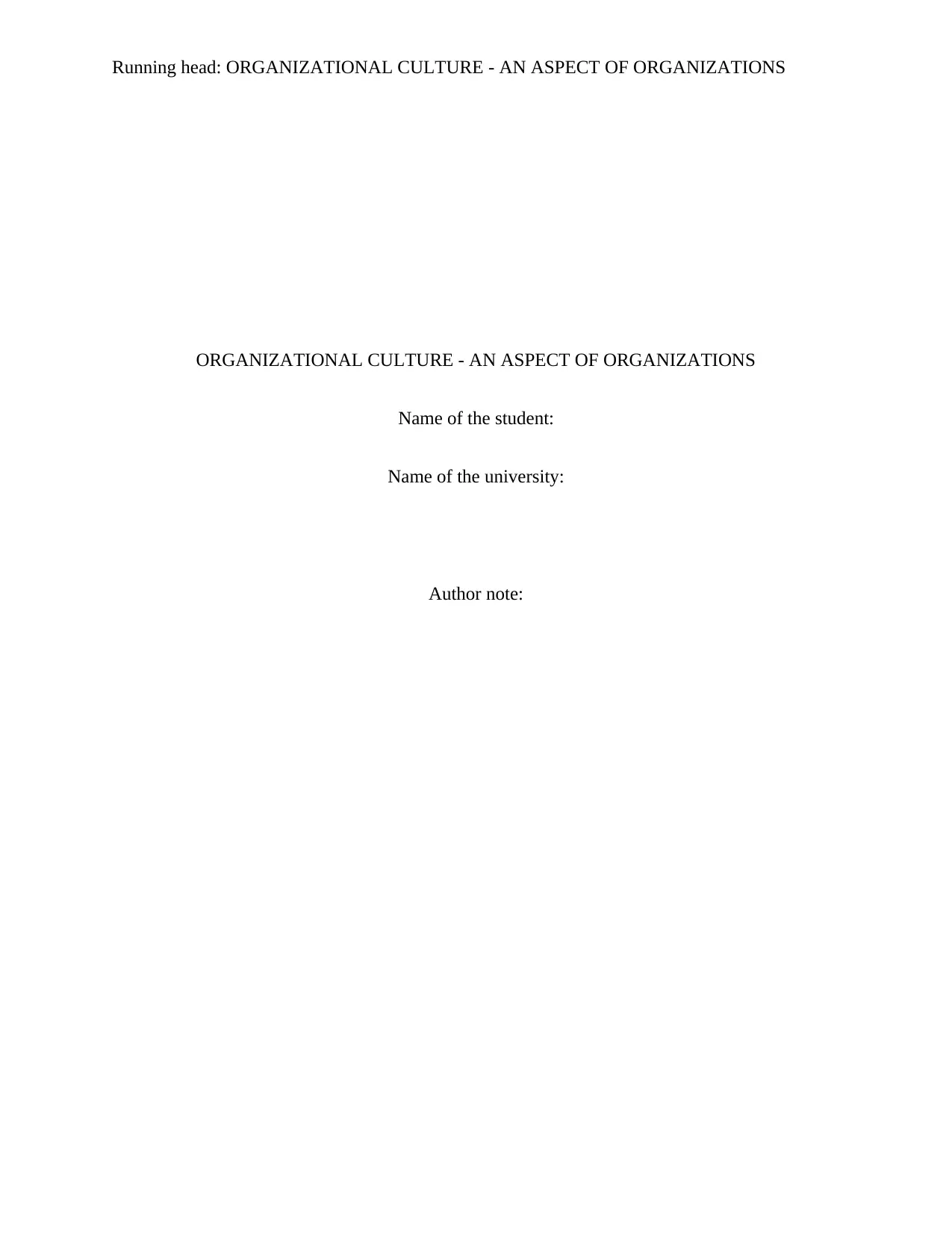
Running head: ORGANIZATIONAL CULTURE - AN ASPECT OF ORGANIZATIONS
ORGANIZATIONAL CULTURE - AN ASPECT OF ORGANIZATIONS
Name of the student:
Name of the university:
Author note:
ORGANIZATIONAL CULTURE - AN ASPECT OF ORGANIZATIONS
Name of the student:
Name of the university:
Author note:
Paraphrase This Document
Need a fresh take? Get an instant paraphrase of this document with our AI Paraphraser
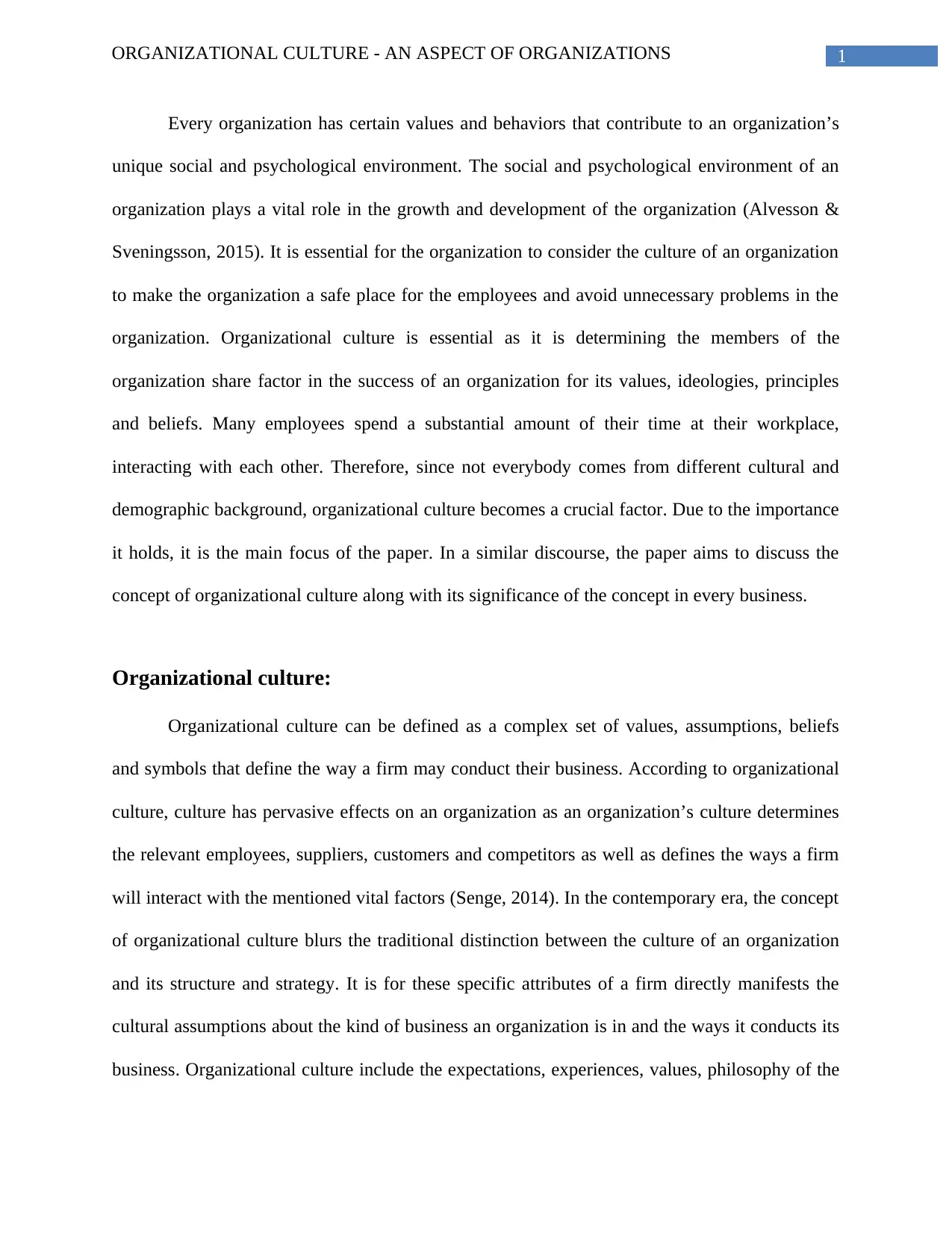
1ORGANIZATIONAL CULTURE - AN ASPECT OF ORGANIZATIONS
Every organization has certain values and behaviors that contribute to an organization’s
unique social and psychological environment. The social and psychological environment of an
organization plays a vital role in the growth and development of the organization (Alvesson &
Sveningsson, 2015). It is essential for the organization to consider the culture of an organization
to make the organization a safe place for the employees and avoid unnecessary problems in the
organization. Organizational culture is essential as it is determining the members of the
organization share factor in the success of an organization for its values, ideologies, principles
and beliefs. Many employees spend a substantial amount of their time at their workplace,
interacting with each other. Therefore, since not everybody comes from different cultural and
demographic background, organizational culture becomes a crucial factor. Due to the importance
it holds, it is the main focus of the paper. In a similar discourse, the paper aims to discuss the
concept of organizational culture along with its significance of the concept in every business.
Organizational culture:
Organizational culture can be defined as a complex set of values, assumptions, beliefs
and symbols that define the way a firm may conduct their business. According to organizational
culture, culture has pervasive effects on an organization as an organization’s culture determines
the relevant employees, suppliers, customers and competitors as well as defines the ways a firm
will interact with the mentioned vital factors (Senge, 2014). In the contemporary era, the concept
of organizational culture blurs the traditional distinction between the culture of an organization
and its structure and strategy. It is for these specific attributes of a firm directly manifests the
cultural assumptions about the kind of business an organization is in and the ways it conducts its
business. Organizational culture include the expectations, experiences, values, philosophy of the
Every organization has certain values and behaviors that contribute to an organization’s
unique social and psychological environment. The social and psychological environment of an
organization plays a vital role in the growth and development of the organization (Alvesson &
Sveningsson, 2015). It is essential for the organization to consider the culture of an organization
to make the organization a safe place for the employees and avoid unnecessary problems in the
organization. Organizational culture is essential as it is determining the members of the
organization share factor in the success of an organization for its values, ideologies, principles
and beliefs. Many employees spend a substantial amount of their time at their workplace,
interacting with each other. Therefore, since not everybody comes from different cultural and
demographic background, organizational culture becomes a crucial factor. Due to the importance
it holds, it is the main focus of the paper. In a similar discourse, the paper aims to discuss the
concept of organizational culture along with its significance of the concept in every business.
Organizational culture:
Organizational culture can be defined as a complex set of values, assumptions, beliefs
and symbols that define the way a firm may conduct their business. According to organizational
culture, culture has pervasive effects on an organization as an organization’s culture determines
the relevant employees, suppliers, customers and competitors as well as defines the ways a firm
will interact with the mentioned vital factors (Senge, 2014). In the contemporary era, the concept
of organizational culture blurs the traditional distinction between the culture of an organization
and its structure and strategy. It is for these specific attributes of a firm directly manifests the
cultural assumptions about the kind of business an organization is in and the ways it conducts its
business. Organizational culture include the expectations, experiences, values, philosophy of the
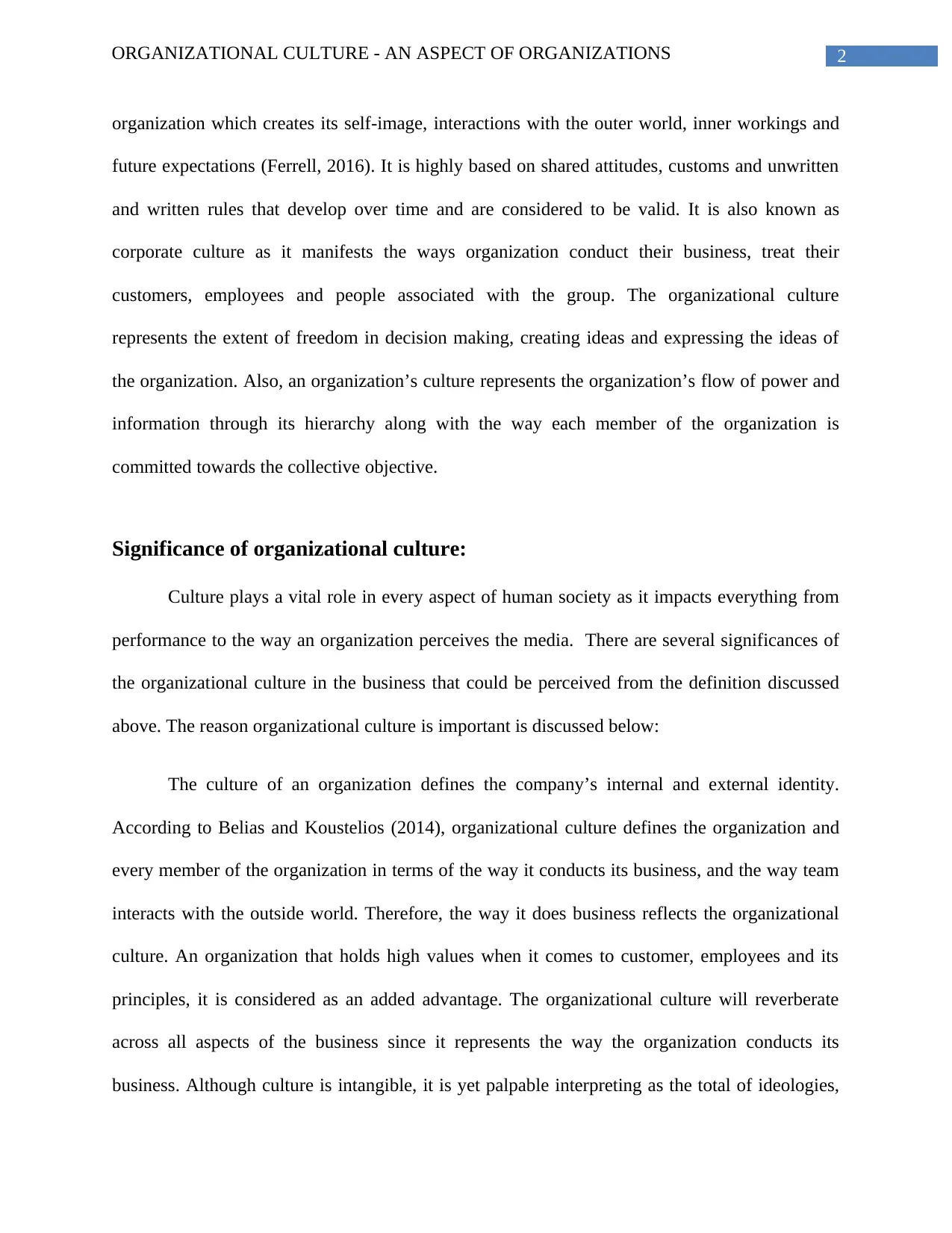
2ORGANIZATIONAL CULTURE - AN ASPECT OF ORGANIZATIONS
organization which creates its self-image, interactions with the outer world, inner workings and
future expectations (Ferrell, 2016). It is highly based on shared attitudes, customs and unwritten
and written rules that develop over time and are considered to be valid. It is also known as
corporate culture as it manifests the ways organization conduct their business, treat their
customers, employees and people associated with the group. The organizational culture
represents the extent of freedom in decision making, creating ideas and expressing the ideas of
the organization. Also, an organization’s culture represents the organization’s flow of power and
information through its hierarchy along with the way each member of the organization is
committed towards the collective objective.
Significance of organizational culture:
Culture plays a vital role in every aspect of human society as it impacts everything from
performance to the way an organization perceives the media. There are several significances of
the organizational culture in the business that could be perceived from the definition discussed
above. The reason organizational culture is important is discussed below:
The culture of an organization defines the company’s internal and external identity.
According to Belias and Koustelios (2014), organizational culture defines the organization and
every member of the organization in terms of the way it conducts its business, and the way team
interacts with the outside world. Therefore, the way it does business reflects the organizational
culture. An organization that holds high values when it comes to customer, employees and its
principles, it is considered as an added advantage. The organizational culture will reverberate
across all aspects of the business since it represents the way the organization conducts its
business. Although culture is intangible, it is yet palpable interpreting as the total of ideologies,
organization which creates its self-image, interactions with the outer world, inner workings and
future expectations (Ferrell, 2016). It is highly based on shared attitudes, customs and unwritten
and written rules that develop over time and are considered to be valid. It is also known as
corporate culture as it manifests the ways organization conduct their business, treat their
customers, employees and people associated with the group. The organizational culture
represents the extent of freedom in decision making, creating ideas and expressing the ideas of
the organization. Also, an organization’s culture represents the organization’s flow of power and
information through its hierarchy along with the way each member of the organization is
committed towards the collective objective.
Significance of organizational culture:
Culture plays a vital role in every aspect of human society as it impacts everything from
performance to the way an organization perceives the media. There are several significances of
the organizational culture in the business that could be perceived from the definition discussed
above. The reason organizational culture is important is discussed below:
The culture of an organization defines the company’s internal and external identity.
According to Belias and Koustelios (2014), organizational culture defines the organization and
every member of the organization in terms of the way it conducts its business, and the way team
interacts with the outside world. Therefore, the way it does business reflects the organizational
culture. An organization that holds high values when it comes to customer, employees and its
principles, it is considered as an added advantage. The organizational culture will reverberate
across all aspects of the business since it represents the way the organization conducts its
business. Although culture is intangible, it is yet palpable interpreting as the total of ideologies,
⊘ This is a preview!⊘
Do you want full access?
Subscribe today to unlock all pages.

Trusted by 1+ million students worldwide
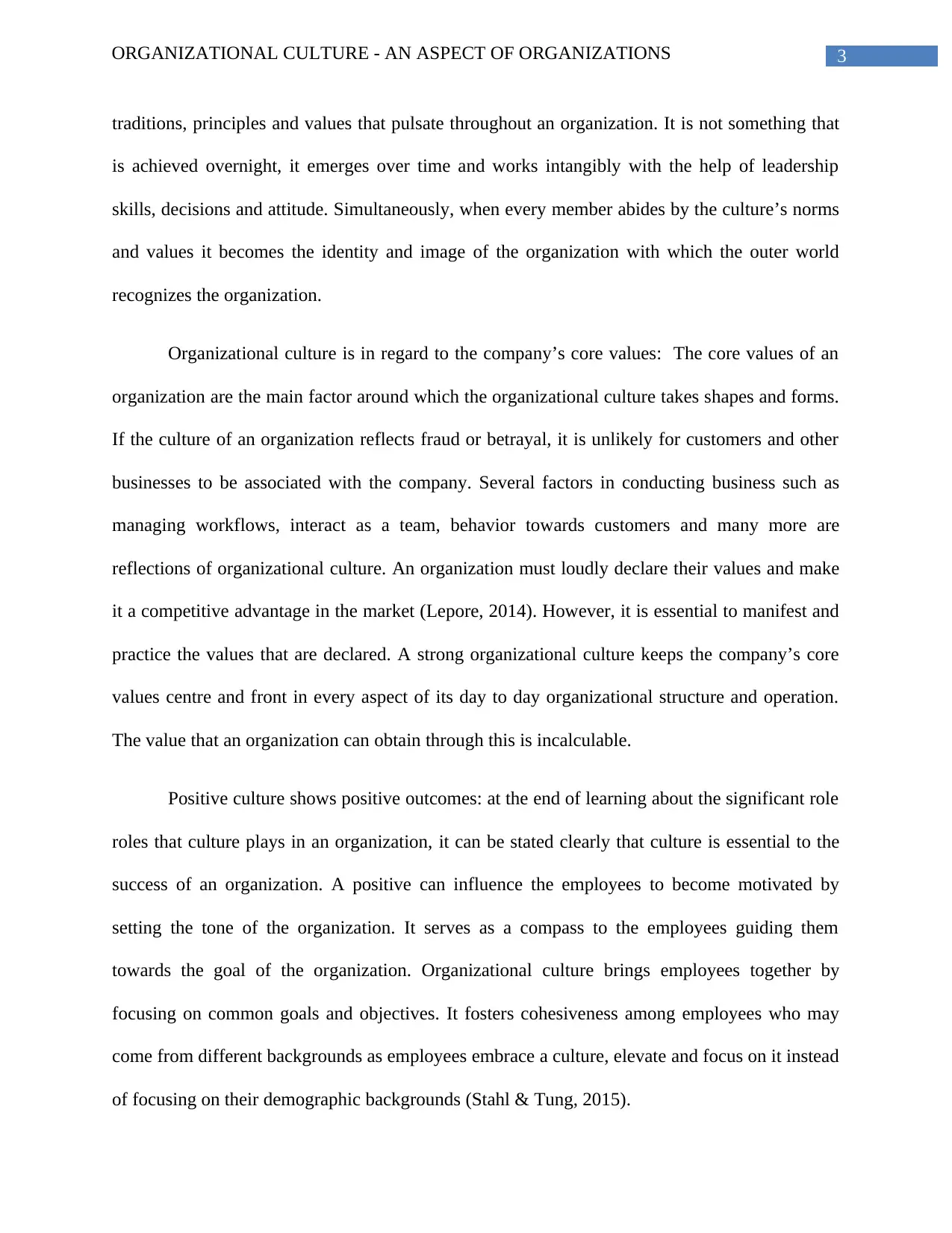
3ORGANIZATIONAL CULTURE - AN ASPECT OF ORGANIZATIONS
traditions, principles and values that pulsate throughout an organization. It is not something that
is achieved overnight, it emerges over time and works intangibly with the help of leadership
skills, decisions and attitude. Simultaneously, when every member abides by the culture’s norms
and values it becomes the identity and image of the organization with which the outer world
recognizes the organization.
Organizational culture is in regard to the company’s core values: The core values of an
organization are the main factor around which the organizational culture takes shapes and forms.
If the culture of an organization reflects fraud or betrayal, it is unlikely for customers and other
businesses to be associated with the company. Several factors in conducting business such as
managing workflows, interact as a team, behavior towards customers and many more are
reflections of organizational culture. An organization must loudly declare their values and make
it a competitive advantage in the market (Lepore, 2014). However, it is essential to manifest and
practice the values that are declared. A strong organizational culture keeps the company’s core
values centre and front in every aspect of its day to day organizational structure and operation.
The value that an organization can obtain through this is incalculable.
Positive culture shows positive outcomes: at the end of learning about the significant role
roles that culture plays in an organization, it can be stated clearly that culture is essential to the
success of an organization. A positive can influence the employees to become motivated by
setting the tone of the organization. It serves as a compass to the employees guiding them
towards the goal of the organization. Organizational culture brings employees together by
focusing on common goals and objectives. It fosters cohesiveness among employees who may
come from different backgrounds as employees embrace a culture, elevate and focus on it instead
of focusing on their demographic backgrounds (Stahl & Tung, 2015).
traditions, principles and values that pulsate throughout an organization. It is not something that
is achieved overnight, it emerges over time and works intangibly with the help of leadership
skills, decisions and attitude. Simultaneously, when every member abides by the culture’s norms
and values it becomes the identity and image of the organization with which the outer world
recognizes the organization.
Organizational culture is in regard to the company’s core values: The core values of an
organization are the main factor around which the organizational culture takes shapes and forms.
If the culture of an organization reflects fraud or betrayal, it is unlikely for customers and other
businesses to be associated with the company. Several factors in conducting business such as
managing workflows, interact as a team, behavior towards customers and many more are
reflections of organizational culture. An organization must loudly declare their values and make
it a competitive advantage in the market (Lepore, 2014). However, it is essential to manifest and
practice the values that are declared. A strong organizational culture keeps the company’s core
values centre and front in every aspect of its day to day organizational structure and operation.
The value that an organization can obtain through this is incalculable.
Positive culture shows positive outcomes: at the end of learning about the significant role
roles that culture plays in an organization, it can be stated clearly that culture is essential to the
success of an organization. A positive can influence the employees to become motivated by
setting the tone of the organization. It serves as a compass to the employees guiding them
towards the goal of the organization. Organizational culture brings employees together by
focusing on common goals and objectives. It fosters cohesiveness among employees who may
come from different backgrounds as employees embrace a culture, elevate and focus on it instead
of focusing on their demographic backgrounds (Stahl & Tung, 2015).
Paraphrase This Document
Need a fresh take? Get an instant paraphrase of this document with our AI Paraphraser
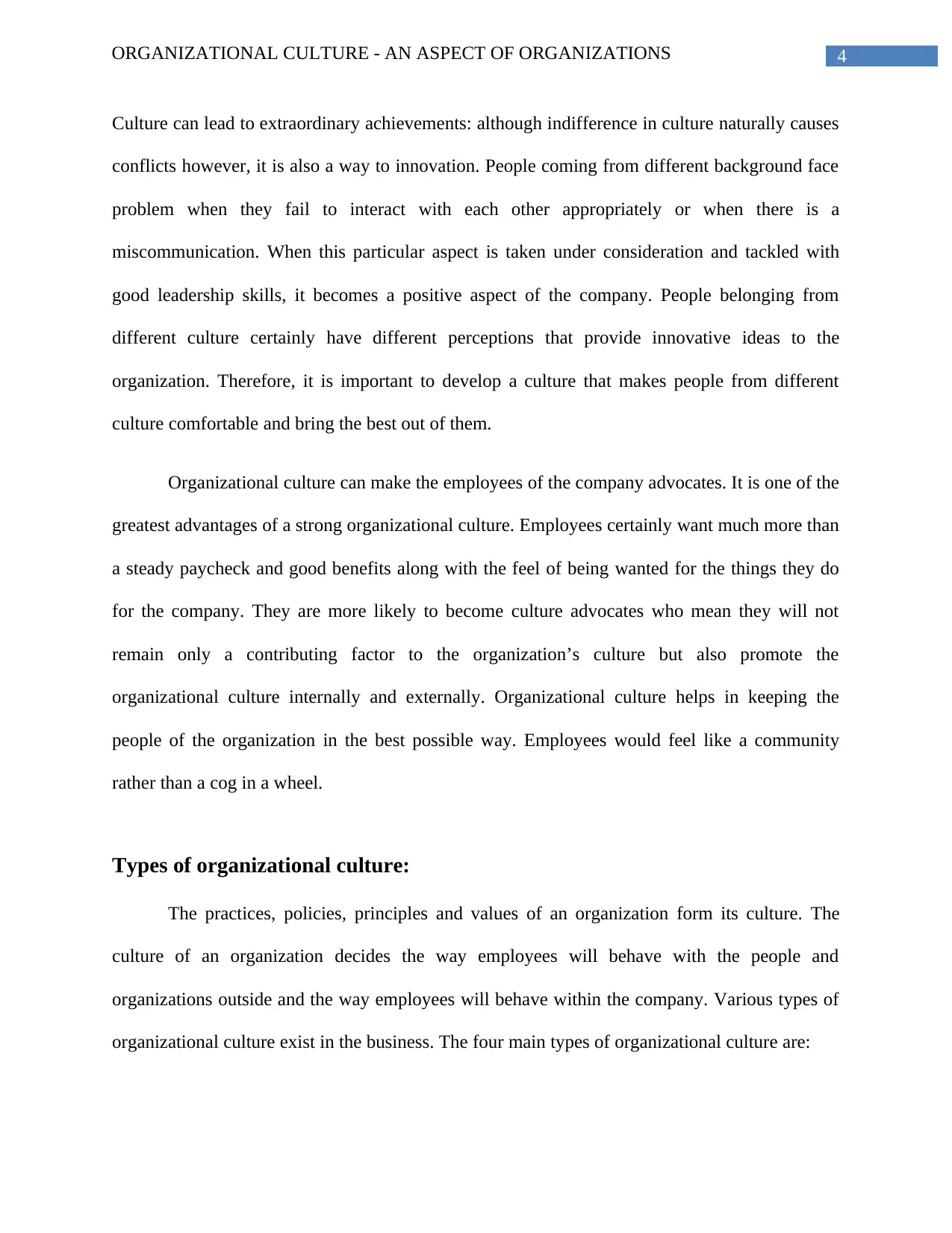
4ORGANIZATIONAL CULTURE - AN ASPECT OF ORGANIZATIONS
Culture can lead to extraordinary achievements: although indifference in culture naturally causes
conflicts however, it is also a way to innovation. People coming from different background face
problem when they fail to interact with each other appropriately or when there is a
miscommunication. When this particular aspect is taken under consideration and tackled with
good leadership skills, it becomes a positive aspect of the company. People belonging from
different culture certainly have different perceptions that provide innovative ideas to the
organization. Therefore, it is important to develop a culture that makes people from different
culture comfortable and bring the best out of them.
Organizational culture can make the employees of the company advocates. It is one of the
greatest advantages of a strong organizational culture. Employees certainly want much more than
a steady paycheck and good benefits along with the feel of being wanted for the things they do
for the company. They are more likely to become culture advocates who mean they will not
remain only a contributing factor to the organization’s culture but also promote the
organizational culture internally and externally. Organizational culture helps in keeping the
people of the organization in the best possible way. Employees would feel like a community
rather than a cog in a wheel.
Types of organizational culture:
The practices, policies, principles and values of an organization form its culture. The
culture of an organization decides the way employees will behave with the people and
organizations outside and the way employees will behave within the company. Various types of
organizational culture exist in the business. The four main types of organizational culture are:
Culture can lead to extraordinary achievements: although indifference in culture naturally causes
conflicts however, it is also a way to innovation. People coming from different background face
problem when they fail to interact with each other appropriately or when there is a
miscommunication. When this particular aspect is taken under consideration and tackled with
good leadership skills, it becomes a positive aspect of the company. People belonging from
different culture certainly have different perceptions that provide innovative ideas to the
organization. Therefore, it is important to develop a culture that makes people from different
culture comfortable and bring the best out of them.
Organizational culture can make the employees of the company advocates. It is one of the
greatest advantages of a strong organizational culture. Employees certainly want much more than
a steady paycheck and good benefits along with the feel of being wanted for the things they do
for the company. They are more likely to become culture advocates who mean they will not
remain only a contributing factor to the organization’s culture but also promote the
organizational culture internally and externally. Organizational culture helps in keeping the
people of the organization in the best possible way. Employees would feel like a community
rather than a cog in a wheel.
Types of organizational culture:
The practices, policies, principles and values of an organization form its culture. The
culture of an organization decides the way employees will behave with the people and
organizations outside and the way employees will behave within the company. Various types of
organizational culture exist in the business. The four main types of organizational culture are:
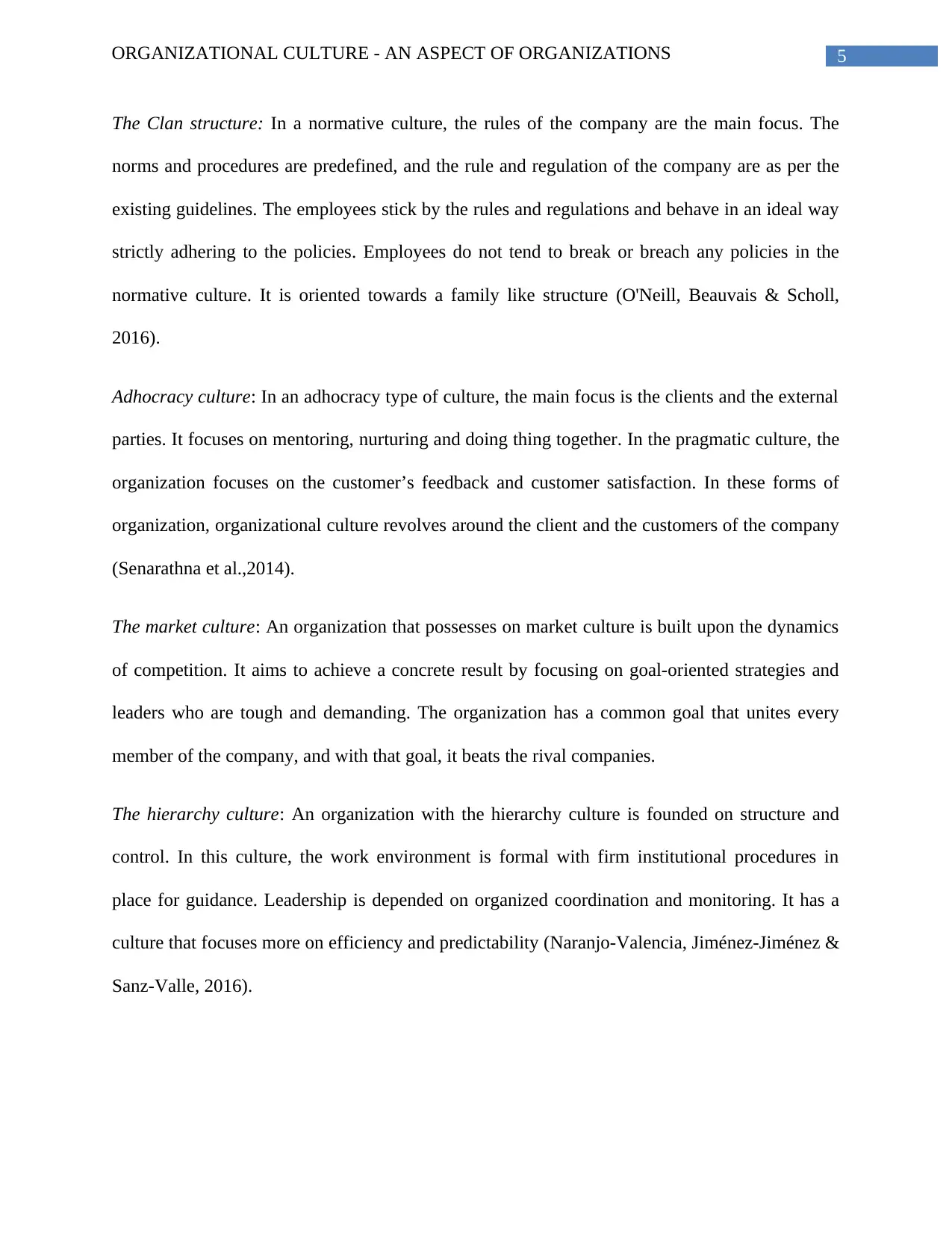
5ORGANIZATIONAL CULTURE - AN ASPECT OF ORGANIZATIONS
The Clan structure: In a normative culture, the rules of the company are the main focus. The
norms and procedures are predefined, and the rule and regulation of the company are as per the
existing guidelines. The employees stick by the rules and regulations and behave in an ideal way
strictly adhering to the policies. Employees do not tend to break or breach any policies in the
normative culture. It is oriented towards a family like structure (O'Neill, Beauvais & Scholl,
2016).
Adhocracy culture: In an adhocracy type of culture, the main focus is the clients and the external
parties. It focuses on mentoring, nurturing and doing thing together. In the pragmatic culture, the
organization focuses on the customer’s feedback and customer satisfaction. In these forms of
organization, organizational culture revolves around the client and the customers of the company
(Senarathna et al.,2014).
The market culture: An organization that possesses on market culture is built upon the dynamics
of competition. It aims to achieve a concrete result by focusing on goal-oriented strategies and
leaders who are tough and demanding. The organization has a common goal that unites every
member of the company, and with that goal, it beats the rival companies.
The hierarchy culture: An organization with the hierarchy culture is founded on structure and
control. In this culture, the work environment is formal with firm institutional procedures in
place for guidance. Leadership is depended on organized coordination and monitoring. It has a
culture that focuses more on efficiency and predictability (Naranjo-Valencia, Jiménez-Jiménez &
Sanz-Valle, 2016).
The Clan structure: In a normative culture, the rules of the company are the main focus. The
norms and procedures are predefined, and the rule and regulation of the company are as per the
existing guidelines. The employees stick by the rules and regulations and behave in an ideal way
strictly adhering to the policies. Employees do not tend to break or breach any policies in the
normative culture. It is oriented towards a family like structure (O'Neill, Beauvais & Scholl,
2016).
Adhocracy culture: In an adhocracy type of culture, the main focus is the clients and the external
parties. It focuses on mentoring, nurturing and doing thing together. In the pragmatic culture, the
organization focuses on the customer’s feedback and customer satisfaction. In these forms of
organization, organizational culture revolves around the client and the customers of the company
(Senarathna et al.,2014).
The market culture: An organization that possesses on market culture is built upon the dynamics
of competition. It aims to achieve a concrete result by focusing on goal-oriented strategies and
leaders who are tough and demanding. The organization has a common goal that unites every
member of the company, and with that goal, it beats the rival companies.
The hierarchy culture: An organization with the hierarchy culture is founded on structure and
control. In this culture, the work environment is formal with firm institutional procedures in
place for guidance. Leadership is depended on organized coordination and monitoring. It has a
culture that focuses more on efficiency and predictability (Naranjo-Valencia, Jiménez-Jiménez &
Sanz-Valle, 2016).
⊘ This is a preview!⊘
Do you want full access?
Subscribe today to unlock all pages.

Trusted by 1+ million students worldwide
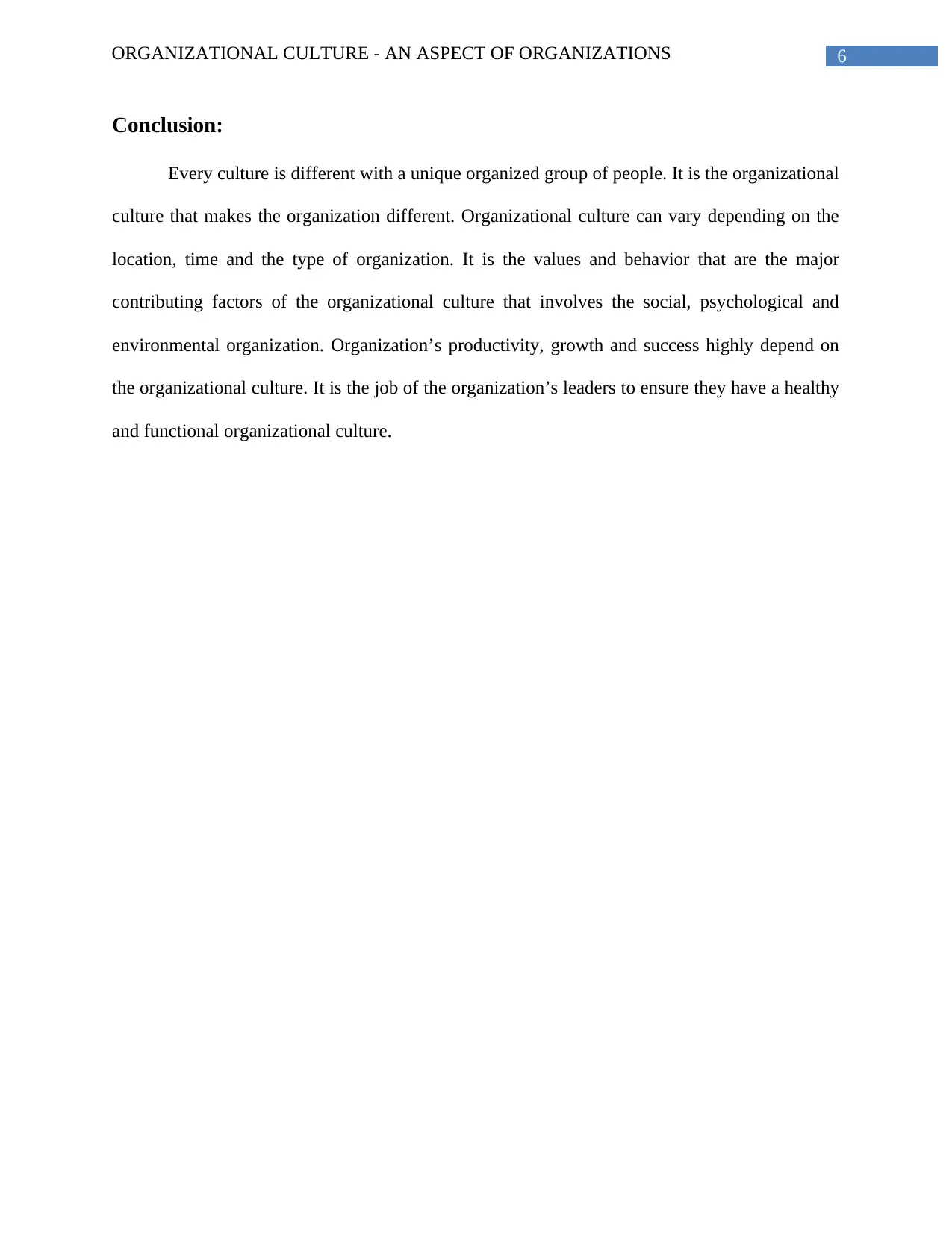
6ORGANIZATIONAL CULTURE - AN ASPECT OF ORGANIZATIONS
Conclusion:
Every culture is different with a unique organized group of people. It is the organizational
culture that makes the organization different. Organizational culture can vary depending on the
location, time and the type of organization. It is the values and behavior that are the major
contributing factors of the organizational culture that involves the social, psychological and
environmental organization. Organization’s productivity, growth and success highly depend on
the organizational culture. It is the job of the organization’s leaders to ensure they have a healthy
and functional organizational culture.
Conclusion:
Every culture is different with a unique organized group of people. It is the organizational
culture that makes the organization different. Organizational culture can vary depending on the
location, time and the type of organization. It is the values and behavior that are the major
contributing factors of the organizational culture that involves the social, psychological and
environmental organization. Organization’s productivity, growth and success highly depend on
the organizational culture. It is the job of the organization’s leaders to ensure they have a healthy
and functional organizational culture.
Paraphrase This Document
Need a fresh take? Get an instant paraphrase of this document with our AI Paraphraser
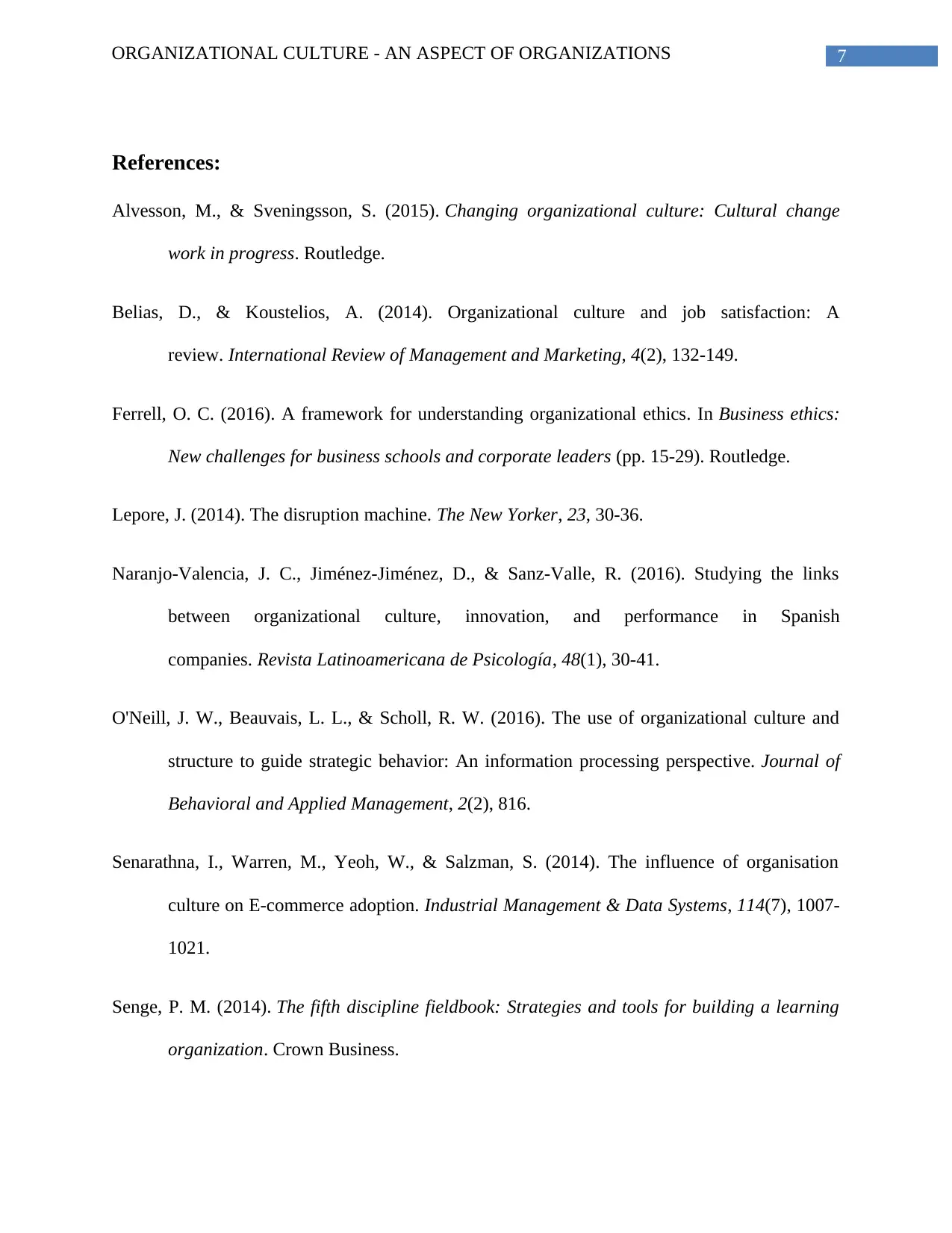
7ORGANIZATIONAL CULTURE - AN ASPECT OF ORGANIZATIONS
References:
Alvesson, M., & Sveningsson, S. (2015). Changing organizational culture: Cultural change
work in progress. Routledge.
Belias, D., & Koustelios, A. (2014). Organizational culture and job satisfaction: A
review. International Review of Management and Marketing, 4(2), 132-149.
Ferrell, O. C. (2016). A framework for understanding organizational ethics. In Business ethics:
New challenges for business schools and corporate leaders (pp. 15-29). Routledge.
Lepore, J. (2014). The disruption machine. The New Yorker, 23, 30-36.
Naranjo-Valencia, J. C., Jiménez-Jiménez, D., & Sanz-Valle, R. (2016). Studying the links
between organizational culture, innovation, and performance in Spanish
companies. Revista Latinoamericana de Psicología, 48(1), 30-41.
O'Neill, J. W., Beauvais, L. L., & Scholl, R. W. (2016). The use of organizational culture and
structure to guide strategic behavior: An information processing perspective. Journal of
Behavioral and Applied Management, 2(2), 816.
Senarathna, I., Warren, M., Yeoh, W., & Salzman, S. (2014). The influence of organisation
culture on E-commerce adoption. Industrial Management & Data Systems, 114(7), 1007-
1021.
Senge, P. M. (2014). The fifth discipline fieldbook: Strategies and tools for building a learning
organization. Crown Business.
References:
Alvesson, M., & Sveningsson, S. (2015). Changing organizational culture: Cultural change
work in progress. Routledge.
Belias, D., & Koustelios, A. (2014). Organizational culture and job satisfaction: A
review. International Review of Management and Marketing, 4(2), 132-149.
Ferrell, O. C. (2016). A framework for understanding organizational ethics. In Business ethics:
New challenges for business schools and corporate leaders (pp. 15-29). Routledge.
Lepore, J. (2014). The disruption machine. The New Yorker, 23, 30-36.
Naranjo-Valencia, J. C., Jiménez-Jiménez, D., & Sanz-Valle, R. (2016). Studying the links
between organizational culture, innovation, and performance in Spanish
companies. Revista Latinoamericana de Psicología, 48(1), 30-41.
O'Neill, J. W., Beauvais, L. L., & Scholl, R. W. (2016). The use of organizational culture and
structure to guide strategic behavior: An information processing perspective. Journal of
Behavioral and Applied Management, 2(2), 816.
Senarathna, I., Warren, M., Yeoh, W., & Salzman, S. (2014). The influence of organisation
culture on E-commerce adoption. Industrial Management & Data Systems, 114(7), 1007-
1021.
Senge, P. M. (2014). The fifth discipline fieldbook: Strategies and tools for building a learning
organization. Crown Business.
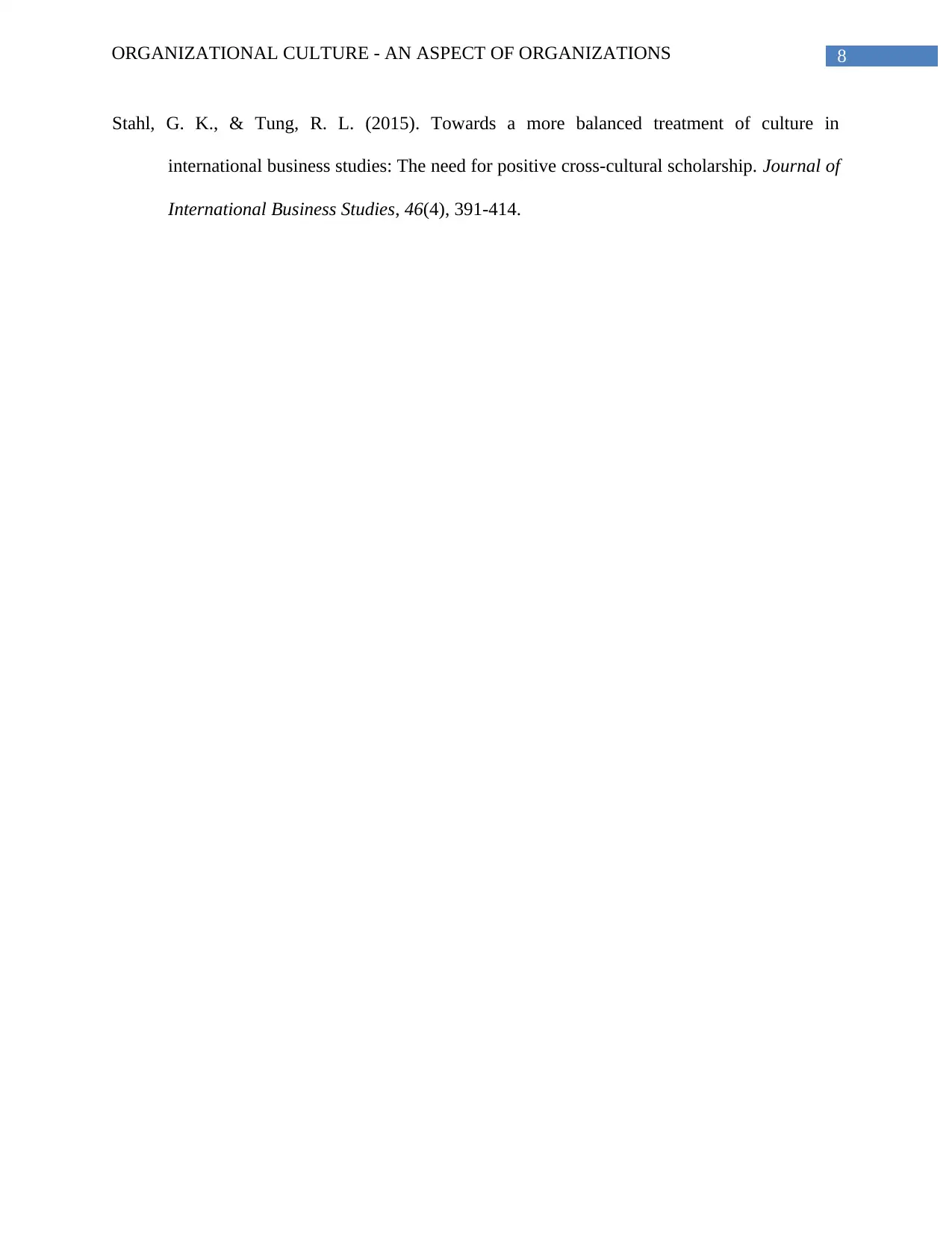
8ORGANIZATIONAL CULTURE - AN ASPECT OF ORGANIZATIONS
Stahl, G. K., & Tung, R. L. (2015). Towards a more balanced treatment of culture in
international business studies: The need for positive cross-cultural scholarship. Journal of
International Business Studies, 46(4), 391-414.
Stahl, G. K., & Tung, R. L. (2015). Towards a more balanced treatment of culture in
international business studies: The need for positive cross-cultural scholarship. Journal of
International Business Studies, 46(4), 391-414.
⊘ This is a preview!⊘
Do you want full access?
Subscribe today to unlock all pages.

Trusted by 1+ million students worldwide
1 out of 9
Related Documents
Your All-in-One AI-Powered Toolkit for Academic Success.
+13062052269
info@desklib.com
Available 24*7 on WhatsApp / Email
![[object Object]](/_next/static/media/star-bottom.7253800d.svg)
Unlock your academic potential
Copyright © 2020–2026 A2Z Services. All Rights Reserved. Developed and managed by ZUCOL.




